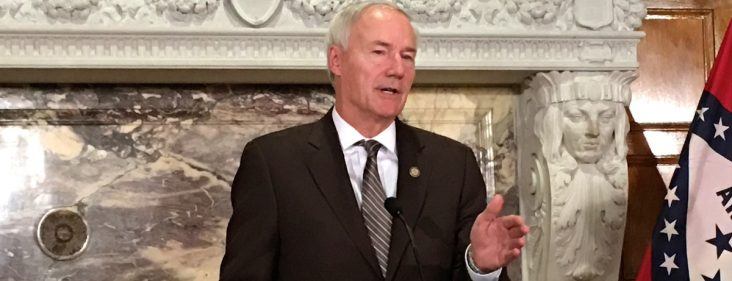Trump’s election alters future of Hutchinson’s Arkansas Works, but how?
by November 9, 2016 5:33 pm 354 views

The election of Donald Trump as U.S. president raises questions about the future of Arkansas Works, but not the immediate future, Gov. Asa Hutchinson said.
In a Wednesday (Nov. 9) press conference at the Capitol, Hutchinson said he would approach the Trump administration with renewed requests to implement some of the reforms the Obama administration denied, including a broad, block-grant waiver that would give Arkansas more flexibility to implement Arkansas Works, and more stringent work requirements. Also “on the table” would be an asset test to help determine eligibility.
Arkansas Works is Hutchinson’s version of the private option, the state program that uses federal Medicaid dollars to purchase private health insurance for Arkansans with incomes up to 138% of the federal poverty level. It was created after the U.S. Supreme Court ruled states could choose whether to expand Medicaid coverage under the Affordable Care Act, also known as Obamacare. Arkansas, under the administration of Gov. Mike Beebe (D), obtained a waiver from the federal Centers for Medicare and Medicaid Services (CMS) in order to purchase private insurance rather than simply expand Medicaid.
The private option has been controversial since it was created in 2013. In 2015, Hutchinson persuaded legislators to approve it for two more years to allow time for broad Medicaid reform. One result of that reform was Arkansas Works, which requires a $13 co-pay from higher-income recipients and makes other reforms. The Hutchinson administration is in the process of obtaining a waiver from the Obama administration to implement those reforms, which is expected to be granted by the end of this year.
Meanwhile, the number of Arkansans enrolled through the private option increased to 324,318 as of the end of September – much higher than the 250,000 originally forecast.
Hutchinson said he expects the Trump administration quickly to offer states more flexibility, saying, “I expect fairly significant and dramatic changes in reference to health care policy in relationship to the states in the future.”
The chairman of a Health Reform Legislative Task Force set up to study health reform, Sen. Jim Hendren, R-Gravette, agreed, saying in a text, “(It’s) a whole new ballgame.”
Longer term, Hutchinson said Congress and the Trump administration will engage in a debate on the future of the Affordable Care Act. Trump and Republicans have long vowed to repeal it. The outcome of that debate is unclear, said Ray Hanley, director of the Arkansas Foundation for Medical Care, a health care improvement organization. Hanley said Wednesday he had been having conversations with colleagues across the country about what Trump’s election would mean for health care policy.
Hanley said while Republicans have promised to repeal and replace Obamacare, plans for the replacement have been vague. The budget reconciliation process would be required to overcome a Senate filibuster by Democrats. Possible changes would allow less expensive coverage than what is mandated by the Affordable Care Act, as well as repealing taxes on high-cost employer plans and medical devices. Resurrecting high-risk pools will be discussed, and the Trump administration can create change simply by not spending money on programs. States likely could choose whether they would expand Medicaid through a block grant or through the current funding option.
Also, there will be a push to repeal mandates to purchase health insurance, or perhaps Trump would direct the IRS to stop enforcing the mandate.
However, Republicans have committed to keep the Affordable Care Act’s requirement that people with pre-existing conditions be covered, which is problematic without a mandate to buy health insurance because people can wait until they are sick to make the purchase.
“There is a high likelihood that it will be repealed but replaced by something that does a lot of the same things, but I suspect at a lower cost with more options for coverage so that the consumers have lower cost options to choose from,” he said.
He said repealing and replacing probably would have to occur at the same time, but it’s not guaranteed that the ACA will be repealed.
“You can’t yank coverage away from probably 20 million people very easily that have gained it. You’ve got to deal with the issue of insurability and pre-existing conditions,” he said.
Hutchinson said he would react to whatever comes from the debate.
“As I said last year, I have to make judgments every day based on what federal policy is,” he said. “When federal policy changes, we’ll make necessary judgments here in Arkansas, and that future remains undetermined, but our immediate future is Arkansas Works.”
Asked if he would want Medicaid coverage to continue, Hutchinson said, “I’m not going to speculate as to what should happen in the future based on what Congress may or may not do on the Affordable Care Act. When I see the direction of it, I can engage in the debate, and then I can respond to what is passed.”
